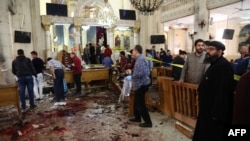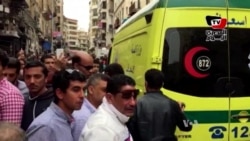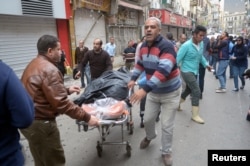Bomb attacks at two Coptic churches in Egypt killed at least 44 people and injured more than 100 as worshipers where marking Palm Sunday.
The first blast was in the northern city of Tanta, where a powerful explosion ripped through a Palm Sunday service at St. George's Church, killing 27 people and wounding 78 others, state TV reported. The explosive device was planted under a seat in the main prayer hall, it said.
In a separate incident, at least 17 people were killed and 41 others wounded in a suicide bomb attack outside St. Mark's Coptic Orthodox Cathedral in Alexandria.
Islamic State has claimed responsibility for both blasts.
In Alexandria, Pope Tawadros II, head of the Coptic Church, had been attending mass inside the targeted church but was not hurt, state media reported.
Watch: Two Coptic Churches Bombed on Palm Sunday
After the bombings, Egyptian President Abdel Fattah el-Sissi declared a three-month state of emergency. "A series of steps will be taken, most importantly, the announcement of a state of emergency for three months after legal and constitution steps are taken," Sissi said in a speech aired on state television.
The blasts appear to have been timed for maximum impact, as people gathered to mark Palm Sunday. It is one of the holiest days in the Christian calendar, marking the triumphal entry of Jesus into Jerusalem.
Egypt’s Christian minority, which makes up roughly 10 percent of the population, has increasingly been targeted by Islamist extremists.
Bishop Suriel, a Coptic Christian leader in Melbourne, Australia, told VOA more needs to be done to increase security to protect Christians, as well as to combat terrorism that affects places all across the world.
He said attacks like the ones Sunday do not deter Coptic Christians.
"In fact after such events we find that our churches are even more full and more people are coming to pray, and we raise their hearts to God for mercy and for strength," he said.
On Sunday, Pope Francis, the leader of the Roman Catholic Church, denounced the bombings and expressed “his deep condolences” to Tawadros II and “all of the dear Egyptian nation.” Sources close to Pope Francis told Arab media he has not canceled plans to visit Egypt, later this month.
U.S. President Donald Trump tweeted, “So sad to hear of the terrorist attack in Egypt. U.S. strongly condemns.' He said he has "great confidence" that President Sissi will handle situation properly.
A Coptic church spokesman said the head of the church, Pope Tawadros III, who was conducting Palm Sunday services inside the the Alexandria church, may have been the target of the attack.
Eyewitnesses in Tanta said an explosive device detonated near the church altar as worshipers recited prayers. Victims of the blast were taken to several nearby hospitals and residents of Tanta were urged to donate blood.
Dr. Amjed Abdel Raouf, Dean of the Tanta Medical College, says doctors are doing their best to care for victims of the blast:
He says that more than 60 wounded people were taken to two government hospitals. He said some victims had suffered burns and others were being treated for shrapnel wounds.
Egypt’s Mufti Shawki Alam condemned the Islamic State group for the blasts, insisting that its followers are “not authentic Muslims.”
He called the group a “criminal, terrorist group, by all measures” and insisted that Egypt is “at a critical point in the life of our nation and that everyone must exert more effort to put an end to extremist ideology and errant interpretations of Islam.







